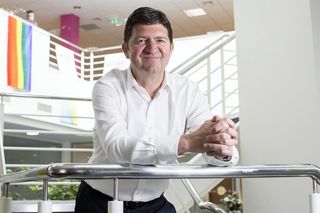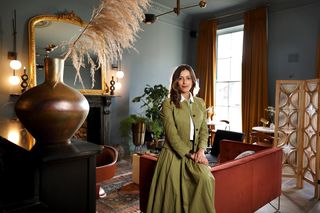The empowered role model putting in long hours for Ireland's home-grown businesses
Julie Sinnamon runs Enterprise Ireland, the single biggest funder of Irish businesses. She spoke to Sarah McCabe on the week of International Women's Day
Julie Sinnamon, Enterprise Ireland
Julie Sinnamon is animated when we meet at Enterprise Ireland's sun-soaked modern offices at East Point business park. The state body moved to its quiet home near the sea in north Dublin a few years ago, consolidating offices that had been dotted around the capital.
She is animated because she can't understand why Ireland's indigenous companies don't get better press.
"Most towns in Ireland have loads of fantastic companies, and people are just not aware that they even exist," she says with a note of frustration in her voice.
"All around the country. Take a company like Dairymaster, there in Causeway in Tralee. You come around a bend and you suddenly see this factory where there is a few hundred people employed and most people have never heard of Dairymaster.
"Go up to Combilift in Monaghan with a few hundred people making forklift trucks, the Saudi Arabian Naval Service is buying them - they're just brilliant.
"Or Aerogen, which takes vaccines and turns it into aerosols. Why would you want to do that?
"Babies in the third world are being treated with their equipment, with masks that deliver life-saving drugs just by breathing. Again, Aerogen - nobody has ever heard of it.
"Movidius, in Trinity, making chips for drones, to stop a drone crashing - it can actually see the obstacle. What they're doing with those chips is a multiple of what their competition is doing. Or we were in China recently with a young company from Carlow that's doing soil re-mediation - a lot of land in China is contaminated - the Chinese couldn't understand why they were only in certain regions, why they weren't everywhere. And yet these stories are not known."
Sinnamon, who lives in Dublin's Glenageary and has two children, has been chief executive of Enterprise Ireland (EI), the taxpayer-funded agency tasked with supporting export-oriented Irish businesses, for two and-a-half years. Its 2016 budget is €257m. Sometimes described as Europe's biggest venture-capital fund, EI is probably best known as an investor. It has channelled funding, directly and indirectly, into hundreds of companies around the country.
International investment platform PitchBook recently ranked it number three in the world for seed investment.
Originally from Co Down, Sinnamon has a colourful background - she is one of 13 children whose upbringing was entrenched in business. Her father had a poultry processing business, later diversifying into cars, petrol stations and retail as his family grew. And all the Sinnamon kids pitched in.
She loved business, she says, and decided to study it at the University of Ulster. It brought her to Dublin in the early 1980s on a work-experience placement as part of her degree. She arrived just as the capital was beginning to welcome the foreign companies that would shape Ireland's economy for the next three decades.
"I was just amazed at the number of multinationals that had decided to locate in the Republic," she says. "I went back to college and did my thesis on those decisions, looking at the Republic of Ireland, Northern Ireland and Scotland, why companies located where they did."
She moved back to Dublin again after college to work for Trinity Bank but was soon recruited by the IDA, which was fast building a reputation as Europe's top suitor for foreign investors.
"I spent most of my time working with food companies and particularly enjoyed working with young start-up companies," she recalls.
When Enterprise Ireland was set up with the Industrial Development Act 1998 to handle indigenous businesses, she followed that passion. She climbed the ladder over the years - managing EI's investment services division, handling change management - eventually reaching director of global business development. When Frank Ryan stepped down as chief executive two-and-a-half years ago, she took the top job.
(Ryan is now chairman of the IDA. He served two five-year terms at EI, from 2003 to 2012, during which time Irish exports grew from €9.6bn to a record high of €16.2bn, despite the financial crisis.)
Sinnamon is the first female chief executive that Enterprise Ireland has ever had. As the events held last week for International Women's Day attested, the pool of women in top Irish jobs is still small - the same faces appeared again and again. Having smashed the glass ceiling at EI, one of Sinnamon's goals as chief executive is to help ensure better gender diversity at client companies.
"If you go back to 2011, we were supporting about 100 companies on our High Potential Start-Up programme. Only about 7pc of those had a woman on their founding team. The same was true globally," she says. The reasons were "everything from confidence, access to funding, the networking area - men are much better at networking - and the lack of role models.
"If you can't see it, you can't be it. Research shows females are much more influenced by role models than males are."
She was personally blessed with lots of good female role models throughout her life, she says, starting with her maternal grandmother and her mother.
"She lived in that era when you had to give up your job once you got married. But she ploughed straight into the family business - she was very active in running it with my father."
EI put a number of initiatives in place to address the balance, like female-only start-up funds. They appear to be working. In the years since 2011, the number of women in its HPSU class grew from 7pc to 22pc.
Some say female-only programmes unnecessarily segregate women; but otherwise, many women would just not apply for funding at all, Sinnamon says. "It was partly a perception thing. Women just didn't think EI was for them."
Gender imbalances at Irish start-ups will only change when gender imbalances in positions of power change, she believes.
"About two-thirds of our start-ups come from middle and senior management in existing Irish companies. In middle and senior management, there is a strong bias towards males."
EI's executive committee is mostly men, she adds. "That's something which, like lots of other organisations, is a key focus for us."
EI's strategic focus has shifted in other ways too. It is widely accepted that while Ireland is good at starting businesses and attracting foreign multinationals, it is not an easy place to grow a medium-sized company.
For a long time, the emphasis at EI was on supporting start-ups. Now the priority is to scale existing businesses, to help fledgling Kerry Groups grow, rather than set up lots of small competitors.
"We want to try and grow a bigger cohort of companies of scale, put a bigger emphasis on growing the companies we have" says Sinnamon.
Supporting regional businesses is also a bigger priority than ever before, she adds. Of the 10,169 net new jobs EI says were created by the companies it supports in 2015, 64pc of them were created outside of Dublin.
Another priority is market diversification among the companies it supports, particularly in light of the looming possibility of Britain's exit from the EU.
"Our companies have reduced their reliance on Britain in recent years but it still is, and will remain, our top market for exports. I'm against a Brexit," she says.
One of the criticisms regularly levied at Enterprise Ireland is that a lot of the taxpayer money it funnels into companies and funds amounts to nothing - recipients fail or under-perform. It wrote off €19m in 2014 from investments gone bad and has been hit with lots of negative media coverage highlighting losses on investments.
Sinnamon says the overall picture is one of money well spent.
"We would be the envy of a lot of other countries. If you take our investment in venture capital funds, we do so on exactly the same terms as the private sector. Globally, in most cases, the State takes the first hit."
The same is true for direct investments, she says.
"Every year we directly invest about €30m in start-up companies. Our money going into start-up companies goes in by way of equity - either in convertible preference shares or in ordinary shares. It goes in on the same terms as the private sector.
"We are particularly focusing on the earlier stage, which is the highest-risk stage.
"When you look at that over a period of time, you can see we actually make a return on that investment - so not only are we getting an economic benefit in terms of jobs and exports, but we're also getting a return on our investment.
"We as a country should be really proud of the approach we adopt. It's putting money into these companies and getting them going when there's nobody else there, and then getting a return on it. That does not mean that there are not losses amongst it.
"At times we take criticism for being too risk averse. I think we have it about right. But you're always looking for new opportunities.
"Every developed country needs to have a strong base of its own companies. We have strong food companies of scale - companies like Glanbia and Kerry - but we don't have that scale across industry."
Food companies are her speciality, having worked with them so long.
Normally, the IDA handles investment into Ireland by foreign companies but food and natural resources are the exception - Enterprise Ireland looks after anything and everything to do with the promotion of those industries.
She cites two major food investments as the things she is proudest of in her time at EI so far.
"One of the hardest-fought projects which we won was the Kerry investment on the Naas road, the Kerry Global Technology Centre, which will employ about 1,000 graduates in food technology.
"It's a world-class facility, probably the best facility in that field in the world, which Ireland competed against the UK and Holland for. We won it against strong competition.
"To see what was a plan, that you talked about and tried to win for Ireland, to see it up and running with graduates in place. That's a key win for Ireland.
"Glanbia's new facility in Waterford is the first greenfield milk-processing factory to be built in Ireland in 40 years. You can say that fast and not really appreciate the significance of it."
"Enjoy your work because life is short"
The best career advice you ever received...
"The best career advice I ever received has to be make sure you enjoy your work. I often tell the story of a training session I did, where the trainer presented the class with a piece of string.
"You're all about 40," he said, so he cut it in half. "And you'll sleep a lot," he added, so he cut it in half again. "If you don't enjoy what you do, I'll have to cut it in half once more" he said at the end.
The piece left was tiny! It really stuck with me!
I work long hours. You have to enjoy the work to do to do that."
The book you are reading at the moment...
"A thriller by Clare Mackintosh called I'll Let You Go. It's not bad."
The best place you've ever travelled to...
"I travel a lot with work, so there's a lot to choose from. I think Asia - China, India - is my favourite."
What is most important to you...
"My family. My daughter is 29 and is a jazz singer, training to be a music therapist, and my son is 19 and in university."
Join the Irish Independent WhatsApp channel
Stay up to date with all the latest news














